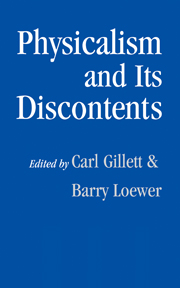Book contents
- Frontmatter
- Contents
- Contributors
- Preface
- Part I Physicalism
- 1 The Rise of Physicalism
- 2 From Physics to Physicalism
- 3 Sufficiency Claims and Physicalism: A Formulation
- 4 Realization and Mental Causation
- 5 Physicalism and Psychology: A Plea for a Substantive Philosophy of Mind
- 6 Davidson and Nonreductive Materialism: A Tale of Two Cultures
- 7 Substance Physicalism
- 8 Possibility: Physical and Metaphysical
- Part II Physicalist Discontents
- Part III Physicalism and Consciousness: A Continuing Dialectic
- References
- Index
8 - Possibility: Physical and Metaphysical
Published online by Cambridge University Press: 02 November 2009
- Frontmatter
- Contents
- Contributors
- Preface
- Part I Physicalism
- 1 The Rise of Physicalism
- 2 From Physics to Physicalism
- 3 Sufficiency Claims and Physicalism: A Formulation
- 4 Realization and Mental Causation
- 5 Physicalism and Psychology: A Plea for a Substantive Philosophy of Mind
- 6 Davidson and Nonreductive Materialism: A Tale of Two Cultures
- 7 Substance Physicalism
- 8 Possibility: Physical and Metaphysical
- Part II Physicalist Discontents
- Part III Physicalism and Consciousness: A Continuing Dialectic
- References
- Index
Summary
It is a commonplace that much of contemporary metaphysics is deeply bound up with the metaphysical modalities: metaphysical possibility and necessity. To take one central instance, the mind-body problem, in its most familiar contemporary form, appears as a problem about property identities, and it is hard to imagine discussing any issue about property identity without calling on the idea of metaphysical possibility. If we want to ask whether the property of being conscious, or being in pain, or having this sort of pain S, is identical with some physical or functional property P – say, the property of having such-and-such neurons firing in such-and-such a way – we typically begin by asking whether I could have had these neurons firing in this particular way, without experiencing S. And the could here is the could of metaphysical possibility.
As we all know, these questions about what could be the case – metaphysically could – are far from easy to answer. There are, it seems to me, two features of the notion of metaphysical possibility that combine to make them hard to settle, either negatively or positively. What makes them hard to settle negatively is that because metaphysical possibility is supposed to be a kind of possibility distinct from physical possibility, styles of argument that work very well to show that various describable situations are not physically possible do not carry over to show that the same situations are not metaphysically possible. Most of us would agree that the standard correlations between brain and pain already give us excellent reasons for believing that it is not physically possible for there to be a perfect neurological duplicate of me who feels no pain at the dentist's.
- Type
- Chapter
- Information
- Physicalism and its Discontents , pp. 172 - 194Publisher: Cambridge University PressPrint publication year: 2001
- 1
- Cited by



